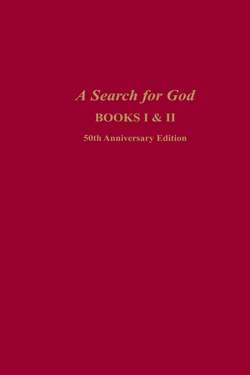Читать книгу A Search for God Anniversary Edition - Edgar Cayce - Страница 38
На сайте Литреса книга снята с продажи.
ОглавлениеLesson V
VIRTUE AND UNDERSTANDING
“Finally, brethren, whatsoever things are true, whatsoever things are honest, whatsoever things are just, whatsoever things are pure, whatsoever things are lovely, whatsoever things are of good report; if there be any virtue, and if there be any praise, think on these things.”
Philippians 4:8
Affirmation
Let virtue and understanding be in me, for my defense is in Thee, O Lord, my Redeemer; for Thou hearest the prayer of the upright in heart.
262-17
V
VIRTUE AND UNDERSTANDING
[Based on Edgar Cayce readings 262-18 through 262-20]
Introduction
In defining virtue and understanding, we must remember that these words are used here in their fuller meaning as expressions or activities of the soul or spirit forces, not as mental or emotional concepts. To establish a common ground, let us say that to be true to that which is pure in our purposes is virtue. Virtue is full cooperation that prepares the way for enlightening and uplifting humanity. Virtue is keeping ourselves in tune with Creative Force, enabling us to know ourselves as we are known by others. Virtue is holding steadfastly to the Ideal that is set in Him, the Lord of Lords and King of Kings. Virtue is pureness of heart, pureness of soul, and pureness of mind that come through His Spirit bearing witness with our spirit. Virtue is the seasoning of faith, the essence of hope, and the crowning element of truth—an attribute of God.
True understanding is beyond the reason of the senses. It is the power to experience and interpret the laws that govern the expression of Creative Force, or God, in and through the physical, mental, and spiritual bodies of humanity. Where there is virtue there will be understanding, for one follows the other. Understanding is the reward of virtue. With virtue, therefore, comes understanding, for the two are as the tenon and the mortise; they fit one with the other. Knowledge is not always understanding. Daily, many experience miracles of which they have no understanding. Few that have mere knowledge get understanding. An understanding of the mysteries of life comes to those only who make a close approach to the Throne. We may know the course of the stars, the intricate formulae of mathematics, and the secrets of sciences, but we cannot understand God's laws until we have experienced that closeness with the Divine that makes us realize that we are part of His laws, rather than mere observers of them. It was no miracle to those who understood Stephen when he said, “Behold, I see the heavens opened, and the Son of Man standing on the right hand of God.”1It was no miracle to the Master when He fed the five thousand with five loaves and two fishes, for He understood the law of supply. It requires an understanding of God's law (love), when such a message is heard even today as, “Lo, I am present with you in this room—I have chosen you as ye have chosen me. Keep the way thou knowest, keep the path thou hast trod, for He is able to deliver thee in every trial, and unto that one who is faithful comes the crown of life. As I am lifted up in thy consciousness, so will I be lifted up in the consciousness of others.”2 With such an understanding comes a finer and more sincere relationship with others, and a higher spiritual concept of self. We link virtue and understanding because they are expressions of the activities of the soul forces. Virtue built into the mind is the only sure path to true understanding. Knowledge assists when it is in harmony and in accord with the Ideal; otherwise, it may become a barrier, a curse, and a dark pit from which it is hard to escape.
Virtue and Understanding Are Spiritual
Those of us who seek virtue and understanding must walk with God. We never sink so low that we do not at some time feel a longing to look up, and to seek something higher than our own selfish desires. Often it takes only a song, a kind word, or a friendly deed to cause the fire of hope to leap and such a prayer to be uttered as “Lord, be merciful to me a sinner!”
